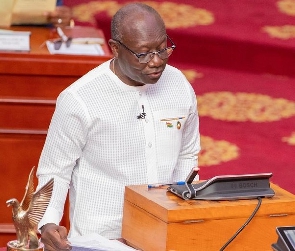 Finance Minister, Ken Ofori-Atta
Finance Minister, Ken Ofori-Atta
Stability and growth are paramount themes of the 2024 fiscal plan, stakeholders at a KPMG/United Nations Development Programme (UNDP) post-2024 budget review in Accra have underscored.
Anthony Sarpong, Senior Partner-KPMG, emphasised that the 2024 budget is aimed at propelling fiscal consolidation, macroeconomic stability, increased growth, currency steadiness and disinflation in the medium-term: “The budget underscores the vital theme of restoring economic stability, a cornerstone for our journey toward stabilising the economy”.
Highlighting recent positive indicators, such as a decrease in October’s inflation to 35.2 percent and relative stability in the exchange rate since mid-year, Mr. Sarpong stressed the pivotal nature of economic stability. He noted its fundamental role in enabling businesses to plan effectively and generate growth opportunities aligning with the global economic landscape.
“The budget’s outlined initiatives address concerns raised in our October 2023 Pre-Budget survey,” Mr. Sarpong mentioned. “Respondents emphasised the adverse impact of economic factors like inflation, interest rates and the tax environment on business performance in 2023. They advocated for fiscal policies targetting investment in productive sectors, widening the tax net, rationalising expenditures and creating sustainable funding for MSMEs.”
Acknowledging Ghana’s ongoing economic recovery journey, Mr. Sarpong emphasised the necessity for collective action by government, businesses and individuals. He urged concerted and disciplined efforts to strengthen the economy for current and future generations.
However, CEO-Association of Ghana Industries (AGI), Seth Twum-Akwaboah expressed both gratitude and concern during the review. While appreciating certain tax revisions based on industry requests, he also raised unresolved issues – notably, the impact of duties on raw materials hindering production due to diminished working capital.
The AGI called for a nuanced approach, advocating reduced duties in specific sectors to bolster production.
The broader medium-term fiscal policy objective centres on reinstating and maintaining macroeconomic stability while ensuring fiscal and debt sustainability. The strategy entails augmenting revenue, rationalising expenditure, implementing crucial reforms, prudently managing debt to prevent arrears accumulation, and supporting fiscal sustainability.
Regarding budget balances and 2024 financing operations, the projected deficit stands at GH¢50.1billion, equivalent to 4.8 percent of GDP. The deficit is slated to be financed through foreign and domestic sources, with net domestic financing estimated at GH¢61.4billion, comprising 99.3 percent of the total financing.
Revenue forecasts for 2024 target GH¢176.4billion, primarily relying on permanent non-oil revenue measures – in line with the IMF-supported PC-PEG and Medium-Term Revenue Strategy. Domestic revenue, including non-oil taxes and other receipts, is projected at GH¢173.3 billion; exhibiting a growth rate of 31.9 percent over the 2023 projected outturn.
Allocated expenditures for 2024 amount to GH¢226.7billion, with primary expenditure – excluding interest payments – estimated at GH¢170.7billion. These figures underscore government’s commitment to allocating resources across sectors to propel growth and development.
Government’s fiscal strategy aims to leverage stability and growth as pillars for economic resilience, fostering a conducive environment for business planning and growth opportunities. Stakeholders continue to engage, advocating for nuanced policy adjustments to optimise outcomes and ensure alignment with overarching goals of economic stability and growth.
Commenting on the budget, Senior Economist at the UNDP for Ghana and The Gambia, Fatmata L. Sesay, emphasised the collaborative effort required to achieve Sustainable Development Goals (SDGs). While commending government’s initiatives in the 2024 budget, she highlighted the need for additional stakeholder involvement; particularly in programmes like the Youth Start initiative.
She stressed that poverty reduction initiatives aim to shift individuals from the informal to the formal sector, necessitating support from both public and private sectors. She emphasised the role of a conducive public sector environment, an educated populace and alignment with SDG targets, especially poverty reduction, education, good health and well-being. Recognising the financial magnitude required for SDGs, she highlighted the role of development partners and collaborations with universities in pursuing these goals.
Ms. Sesay cautioned that although improvements in inflation and GDP growth rates are evident, cautious optimism is warranted. She emphasised sustained efforts from government, the private sector and individuals toward resilience and continuous progress, ensuring the enduring stability witnessed so far.
The 2024 budget manifests Ghana’s intention to navigate the economic landscape by striking a balance between stability and growth, crucial for steering the nation’s economic future.